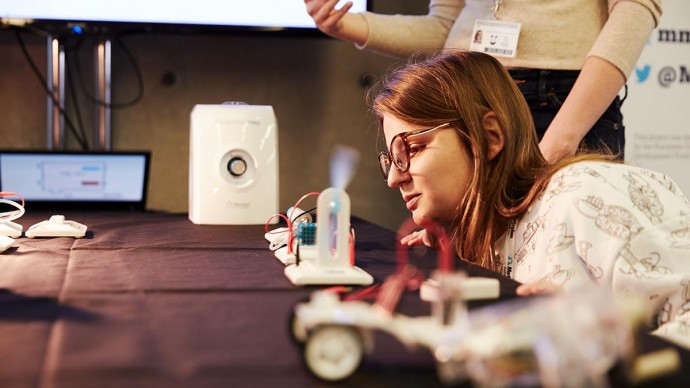
PhD Education Research
Analyse your approach to education with our new professionally focused doctorate.
Course overview
Start date
September 2023
Length of course
Six years, part-time
Location of course
Brooks building, remote research within own professional context
Our PhD Education Research degree aims to equip practitioners in educational contexts to become leaders in their field.
If you’re an educator in any context, from schools and local authorities to health services and community organisations, our professionally focused doctorate could be the next step in your career.
We’ve designed this part-time degree to provide a strong focus on professional practice, allowing you to engage in two years of structured research training before embarking on your independent research.
You’ll receive guidance and research training from expert academics in the internationally renowned Education and Social Research Institute (ESRI), preparing you to produce a shorter thesis than a traditional PhD, which you can use to directly inform your professional practice.
As part of your research training, you’ll be critically examining the latest debates in education, drawing from key philosophical positions to analyse education contexts, policies and practice.
Your training will take place across ten weekends over your first two years, situated at Brooks building. The expectation is that you will spend around 4 hours a week on independent study in addition to the teaching weekends although the workload may vary at different points in the programme. As an important member of ESRI’s postgraduate research community, you would have the opportunity to attend student conferences to support your research, as well as access to other extra curricula activities, such as the ESRI seminar series.
We recruit to the programme every two years to ensure that we are able to effectively staff the research training units and supervisory teams.
The next entry for PhD Education Research is September 2023.
Features and benefits
- An opportunity to make an impact - influence your practice from the outset by critically analysing your current professional role.
- Join an internationally renowned research centre - you’ll immediately join the world-leading Education and Social Research Institute, collaborating with academics who are leading the debate on the future of education.
- Receive enhanced research training and support - you’ll receive more structured research training and support from academics compared to a traditional PhD.
- Embark on learning that fits around you – with ten weekend sessions during the first two years, you can fit this degree around a busy professional life.
Course information
Our PhD Education Research will provide you with the necessary skills to help you to advance your career.
You’ll be able to develop critical reflexivity about your field of practice, establishing theoretical and methodological knowledge and skills, tailored to your profession.
Gaining an insight into the latest educational research, you’ll engage in debates about new directions in education and apply your learning to produce original research.
The PhD Education Research is divided into two parts. Part A is structured around two years of research training units and Part B entails four years of supervised research, resulting in a thesis of between 40,000 and 60,000 words.
Over the course of Part A and Part B, you’ll complete a total of 540 credits:
- 180 credits of short research units (six units worth 30 credits each)
- 360 credits for a thesis
Your postgraduate doctoral degree will be awarded based on the examination of your thesis.
Course structure
You’ll be introduced to potential supervisory teams in Part A and will consult with supervisors while completing the final Part A unit (Research Proposal). Throughout both phases, you’ll be involved in research training and development and will actively participate in one or more of the ESRI research groups.
During Part A, you’ll be supported by an Academic Tutor. The research training units will support you to develop a capacity for critical self-reflection and critical examination of education contexts, policies and practices, with specific reference to your current role.
You’ll develop a firm grounding in contemporary theoretical perspectives, policy analysis, research methodologies and project design. You’ll also engage in, and reflect upon, existing debates about the nature and purposes of education.
You’ll attend ten study weekends and two student conferences over two years.
And you’ll complete five assignments, focused on professionalism and research methods, linked to your immediate professional context.
Part A will be completed in 24 months.
You’ll work with your supervisory team to undertake an independent research project across four years, producing a thesis of between 40,000 and 60,000 words. The thesis is equivalent to 360 credits and you’ll be encouraged to publish your work once you’ve finished.
Please see the PGR regulations for information about the minimum and maximum period of registration.
Part B will be completed in 48 months.
Course units (Part A)
-
PROFESSIONAL INQUIRY 1
In this unit, you’ll identify and articulate a significant issue in your professional practice. You’ll build your capacity to undertake critical reflection about your chosen issue and develop a theoretical understanding of how professional identities are formed.
You’ll explore the debates and tensions surrounding this issue, as recognised in the professional literature. As a result, you’ll learn how to reframe your issue as researchable questions.
-
PRINCIPLES AND DEBATES IN SOCIAL RESEARCH
This unit will introduce you to key principles and debates in relation to the design and practice of research, including consideration of the key philosophical positions that have informed existing research traditions.
The unit covers three broad areas of content that underpin the pursuit of research:
- a range of philosophical and theoretical frameworks within which research is conducted
- a variety of strategies and approaches to designing, conducting, evaluating and analysing research
- critical reflections on the position of the researcher in the research process
It will include a discussion of post-colonial epistemologies and issues of racism within scholarship more broadly, which will allow you to situate the thinking produced within Western scholarship and critically reflect on this.
This unit will also explore visual and creative approaches to research design.
-
THEORY IN SOCIAL RESEARCH
This unit will introduce you to a range of theoretical frameworks relevant to education research.
It will support you to develop your confidence in using theoretical concepts as analytical tools for practitioner inquiry and develop your awareness of the contributions that particular theoretical perspectives have made to the field of education.
-
PROFESSIONAL INQUIRY 2
This unit will equip you with conceptual and analytical tools to understand policymaking processes and appraise the role of evidence, expertise and research as guides to professional action. It will provide an advanced understanding of education policy and evaluation theory.
Focusing on policy literacy, selected topics in education policy studies will provide a basis for in-depth analyses of policy and programmes.
Drawing on earlier units, you’ll revisit accountabilities in education and critically appraise the foundations and influence of the various evidence movement(s) in education and public policy.
This unit continues to address the discussion of professional identities (undertaken in Professional Inquiry 1) to promote reflexivity in practice-oriented education research.
-
INTRODUCTION TO RESEARCH METHODS
This unit will introduce you to a variety of qualitative and quantitative research methods commonly used in education research, developing an appreciation of how these methods may be used to create knowledge.
You’ll gain an overview of the foundational concepts underpinning both qualitative and quantitative methods before learning how to use and evaluate a range of tools, techniques and processes of both qualitative and quantitative research.
-
RESEARCH PROPOSAL
This unit will provide you with an introduction on how to craft a research proposal - which will be undertaken in Part B - and develop an understanding of the process of doing research.
Education and Social Research Institute

Our academics
Our academics
-
Dr Christopher Hanley
Course lead (phase A and phase B)
-
Dr Steph Ainsworth
Unit lead
-
Dr Jonas Thiel
Unit lead
-
Prof. Gabrielle Ivinson
Unit lead
-
Prof. Kate Pahl
Unit lead
Quote
I embarked on an education doctorate at Manchester Met to develop my understanding of the way our organisation works to support excluded children. The training element of the programme gave me the grounding to produce work which systematically improved our practice over time. It has been a transformative process which has become the basis for our work with other schools, professionals and student teachers.
I embarked on an education doctorate at Manchester Met to develop my understanding of the way our organisation works to support excluded children. The training element of the programme gave me the grounding to produce work which systematically improved our practice over time. It has been a transformative process which has become the basis for our work with other schools, professionals and student teachers.
Entry requirements
You must have a relevant masters degree and be working as a professional in education or a similar professional context.
Candidate suitability will be assessed through a written application. The application will require candidates to demonstrate a track record of academic achievement and academic capability commensurate with doctoral study.
The written application will be assessed against the following criteria:
- Sufficient interest in professional or academic inquiry
- Sufficient critical reflexivity about their professional contexts and practice (or the potential to develop it)
- Sufficient interest in current education research (or willingness to develop it)
Successful applicants will also be invited to meet with an academic lead and another relevant staff member to discuss the programme in more detail.
A pre-enrolment meeting will provide an important opportunity for applicants to assess the alignment between the programme and their professional development objectives, and for programme staff to discuss applicants’ research interests, training and development pathways and potential supervision arrangements.
Application guidance
Before you apply, you should ensure that you have gathered the necessary supporting documents required and submit them along with your application where possible: references, passport copy, qualification transcripts and certificates and English language proficiency evidence, where relevant.
How to apply
Applications for September 2023 entry will open in late 2022.
When the application window opens, you need to complete a Critical Reflection Form which you can download, below. Please submit the form, your CV and the supporting documents listed above through our PhD Education Research application portal.
There are a limited number of places available for each cohort, so we recommend that you submit your application as soon as possible.
Next stages of your application
We’ll contact you to let you know the initial outcome of your application and advise of the next steps.
Once the University is satisfied with the following, we will send you an offer letter informing you that you have been offered a place of study:
- Your research proposal
- The entry requirements have been met
- You have satisfactory references
- We have the expertise and resources to be able to supervise you
Some offers may be conditional upon achieving certain grades in prior study, or successfully completing a particular programme. You must satisfy these conditions before we can confirm your unconditional place.
-
Fees and funding
The annual tuition fee for the PhD in Education Research is currently £2750.
You may be eligible for a doctoral loan. Find out more information on doctoral loans.
Related courses and contacts
Contact us
For further information about our PhD Education Research degree, please contact the Part A course lead, Dr Steph Ainsworth.





